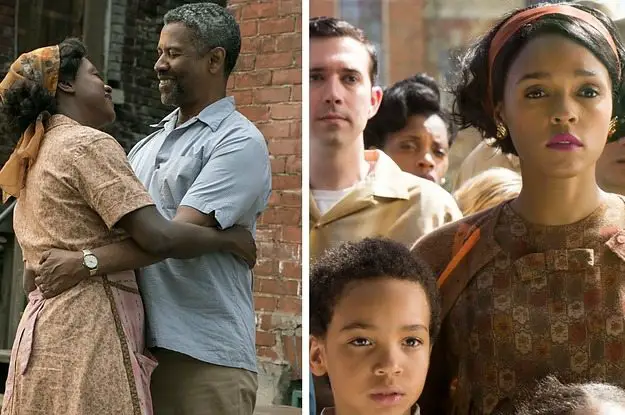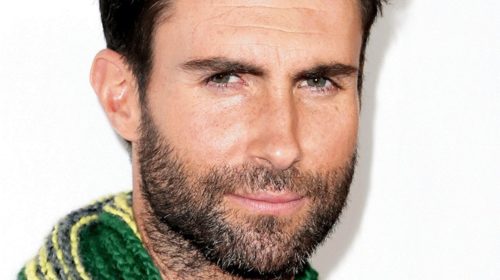How “Fences,” “Hidden Figures,” And “Loving” Navigate 1960s Racism Without Bloodshed
From left: Loving, Fences, and Hidden Figures. Focus Features; Paramount Pictures; 20th Century Fox
ID: 10275544
When the civil rights period is depicted onscreen, there are sometimes billy golf equipment, fireplace hoses, assault canine, marches, and protests. Covering civil rights leaders — like in Malcolm X, or Martin Luther King Jr. in Selma — usually means exhibiting probably the most troublesome and bloody elements of the civil rights motion. This previous yr, nonetheless, a trio of flicks set within the 1950s and ’60s — Fences, Loving, and Hidden Figures — are stepping away from overtly violent bodily manifestations of racism to indicate how practices like segregation affected black Americans psychologically, at work and at dwelling.
The movie adaptation of August Wilson’s Pulitzer Prize–successful play Fences follows the Maxson household, which facilities round explosive patriarch Troy (Denzel Washington). Husband to Rose (Viola Davis), brother to Gabe (Mykelti Williamson), and father to Cory and Lyons (Jovan Adepo and Russell Hornsby, respectively), Troy concurrently delights and destroys everybody he holds shut. The lifelong Negro Leagues baseball participant served time in jail after killing a person; when he’s lastly launched, he’s too outdated to hitch the newly built-in Major League Baseball.
Troy Maxson (Denzel Washington) and his son Cory (Jovan Adepo) in Fences. David Lee / Paramount Pictures
ID: 10275445
Troy and Rose disagree about whether or not it was ageism or racism that killed Troy’s probabilities of baseball stardom, however Washington instructed BuzzFeed News that Troy’s main downside is that he “simply can’t transfer on.” “He’s caught. He forgets the truth that he killed a person and went to jail,” Washington stated in a latest telephone interview. “Maybe he would have made it. All of this occurred as a result of he killed somebody and went to jail.”
“His spouse says, ‘Why don’t you admit you had been simply too outdated,’ and he says, ‘What are you speaking about I used to be simply too outdated? I simply wasn’t the fitting coloration,’” Washington added. “So that’s his hangup.” Racism is the principle scapegoat for Troy’s insecurities and the way he initiatives them onto others.
In his frustration, Troy thwarts his youngest son’s (viable) goals of turning into knowledgeable soccer participant, pushing Cory towards his grocery retailer job as a substitute. “Troy kills all of that due to his bitterness, not due to any racism essentially as a result of they’re coming to provide him a scholarship,” Washington stated. “So [Cory] was about to do higher, however his father killed it due to his bitterness.”
Rather than the explosive epic that normally marks a civil-rights-era movie, Fences gives a nuanced have a look at a considerably strange black household, faraway from the marching, however nonetheless adapting to the modifications of the time. Racism will at all times be a specter looming over their black household, however there are extra alternatives for Troy, Rose, and Cory to succeed when the viewers meets them. While Troy advantages from decreased racial tensions — turning into the primary black rubbish truck driver within the space — he’s so soured by the racism and ageism he skilled in sports activities through the years that he makes use of what held him again as a motive to maintain his son from surpassing him.
Raymond Green (Alano Miller), Garnet Jeter (Terri Abney), Mildred Loving (Ruth Negga), and Richard Loving (Joel Edgerton) in Loving. Focus Features
ID: 10275470
Loving, which was directed by Jeff Nichols and launched in November, focuses on an strange household as nicely, one which finds itself tied to the civil rights motion unintentionally. Richard and Mildred Loving (performed by Joel Edgerton and Ruth Negga) had been a pair in rural Virginia who bought married in Washington, DC, and began a household earlier than being jailed for breaking Virginia’s anti-miscegenation legal guidelines in 1958.
“I didn’t learn about this, and that upset me as a result of I felt like this needs to be a elementary a part of our American historical past,” Nichols stated on the New Yorker Festival in early October. “It virtually looks like now we have a threshold for civil rights historical past … however there’s extra to speak about and there’s extra to be celebrated.”
Loving depicts an interracial couple who dwell life as greatest they will within the face of looming adversity till they’re exiled from Virginia after the police break into their dwelling and see them in mattress collectively, with their marriage certificates on the wall. “I discovered myself considering rather a lot about simply the psychological menace that they needed to dwell beneath after which how fascinating is it that this white man within the 1960s resides beneath a menace that the black group has been and possibly continues to dwell beneath in so many locations and cases,” Nichols stated. “Like, what an attention-grabbing factor to attempt to get folks to really feel. Maybe that’s extra vital than some violent motion or one thing that I may simply invent. … What I hoped to do was attempt to construct up this concept that it’s not the precise menace, it’s the thought of any day someone may come up that highway, and at greatest, it could be a police officer.”
Loving forgoes a lot of the courtroom drama in favor of exhibiting the Lovings at dwelling, not as political figures. “Especially in a yr like [2016], it is vitally simple for us all to go to our corners and cling to our political stances, social stances, no matter they’re, and we overlook in regards to the folks on the heart of all these items, and that’s what it truly is about,” Nichols stated. “These will not be social debates, these will not be political debates, they’re human debates and humanity on the heart of them, and that’s all Richard and Mildred had been doing. Their existence bothered folks, and the way do you argue in opposition to your existence? You can’t.”
During analysis for the movie, Nichols went to the Lovings’ home in Virginia on the lookout for perception as to why Mildred, who was court-ordered to dwell in Washington, DC, went in opposition to the regulation to lift her youngsters in a state the place they had been undesirable. “You simply say, ‘Why would anybody need to dwell in hiding beneath menace of arrest or a lot, a lot worse, or have their household dwell beneath that menace?’ and I feel it was as a result of she was very a lot linked to this place,” Nichols defined. “It’s not nearly it being stunning. It simply has a sense to it that it was very simple for me to be drawn into it. … It is a really essential, distinctive place on this story to permit these two folks to fall in love.” In Loving, Mildred’s return to Virginia isn’t depicted as a political assertion — it’s a acutely aware resolution she makes to lift her youngsters within the surroundings she grew up in and loves, no matter consequence.
Katherine Johnson (Taraji P. Henson), Dorothy Vaughan (Octavia Spencer), and Mary Jackson (Janelle Monáe) in Hidden Figures. 20th Century Fox / Via foxmovies.com
ID: 10275484
This month’s Hidden Figures is of the identical ilk as Loving. The movie, directed by Theodore Melfi, focuses on the untold story of three black girls at NASA who had been important in determining the calculations that might permit the late John Glenn to be the primary American to orbit Earth. “I couldn’t imagine that there have been girls that we didn’t learn about that had been integral within the calculations for the house race,” Melfi instructed BuzzFeed News. “I used to be simply blown away by that, after which to assume that they had been black girls that had been concerned, realizing NASA was segregated, realizing that girls, black girls weren’t even allowed to vote at the moment … it was only a super and impactful story.”
Katherine Johnson (performed by Taraji P. Henson), Dorothy Vaughan (Octavia Spencer), and Mary Jackson (Janelle Monáe) all broke boundaries in their very own means, and with out carrying picket indicators, presumably as a result of protesting wasn’t an possibility. “In 1961 and ’62, Virginia small-town Langley, Hampton Roads, Virginia, there have been no protests, there have been no fireplace hoses, there have been no sit-ins. We dug, we searched, we tried, we wished,” Melfi stated. “There was none of that. These folks lived very quiet middle-class lives, and so they didn’t need hassle. The hassle that they thought was civil rights, that was a youth mission. Like we see Black Lives Matter right now as a youthful mission … youth and schools are the place all the nice stuff begins. It’s the place all the fireplace comes out and builds right into a nationwide motion. … There was none of that in Hampton. So we selected to give attention to the racism that was there, that was prevalent on the time.”
That racism in Hidden Figures presents itself in Katherine having to stroll a half mile to the coloured rest room, Dorothy not being promoted to a supervisor place, and Mary being unable to develop into an engineer with out attending a white college, the latter two of that are additionally primarily based in sexism.
Melfi avoids calling Hidden Figures a civil rights film, however he acknowledges that the racial themes it hits on are nonetheless very a lot part of our tradition. “It’s the unconscious biases, it’s the seems you get from folks due to the colour of your pores and skin or your sexual choice. It’s not getting promoted. It’s getting doorways slammed in your face,” he stated.
Melfi additionally hopes that the truth that folks of various genders and races got here collectively within the early ’60s to get Glenn in orbit will resonate with right now’s broadly divided society. “We put a person in house, we put a person all over the world, across the globe, and that’s what must occur right now,” he stated. “With all of the division within the nation, America can discover its unity, and this can be a small reminder of that.”
With movies like 1988’s Mississippi Burning, 1990’s The Long Walk Home, and 2013’s The Butler, Hollywood has an extended historical past of specializing in the extra outstanding figures and violent moments within the civil rights motion. But motion pictures that target strange folks, like Fences, Loving, and Hidden Figures, normalize African-American historical past as American historical past.






